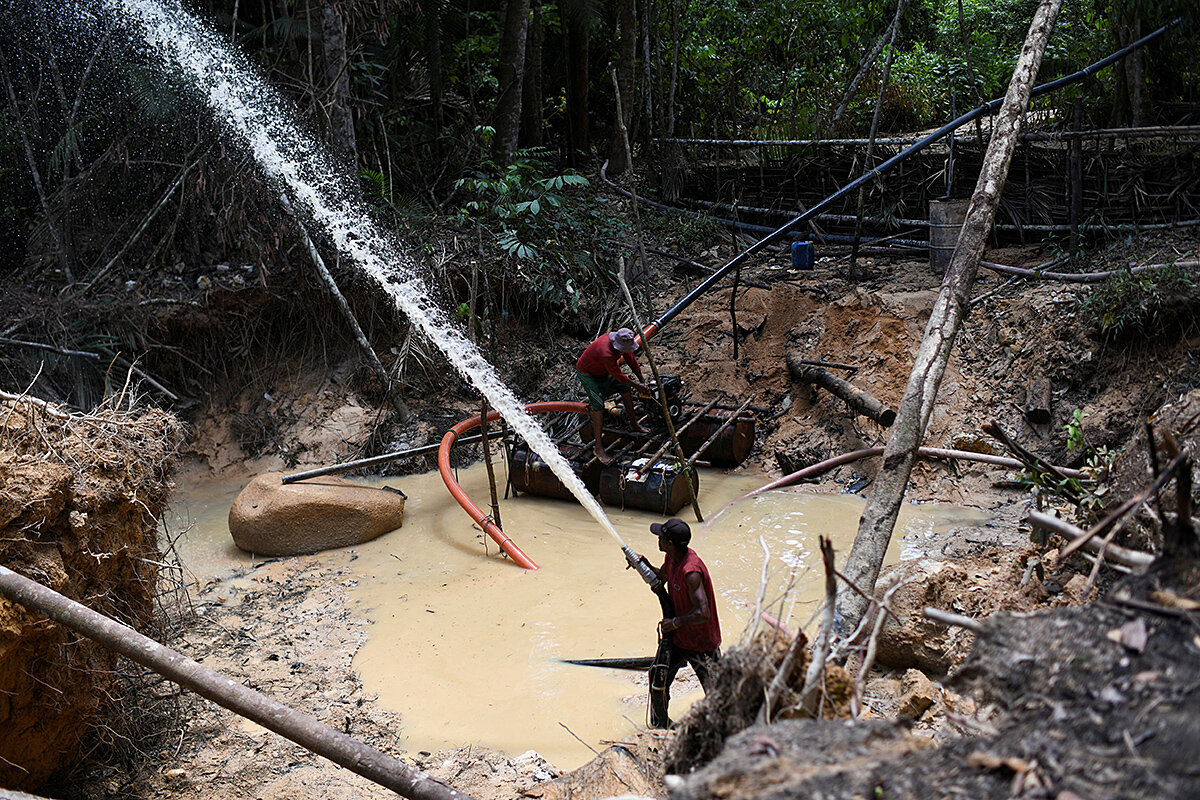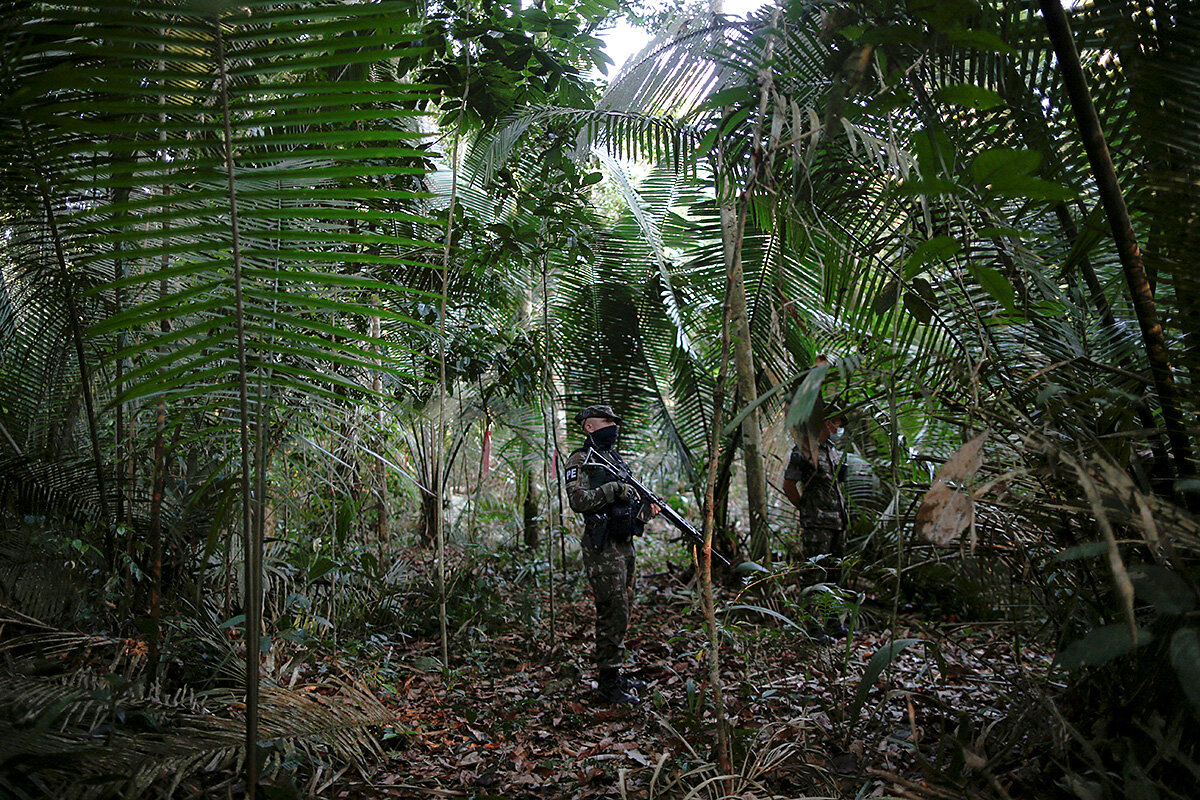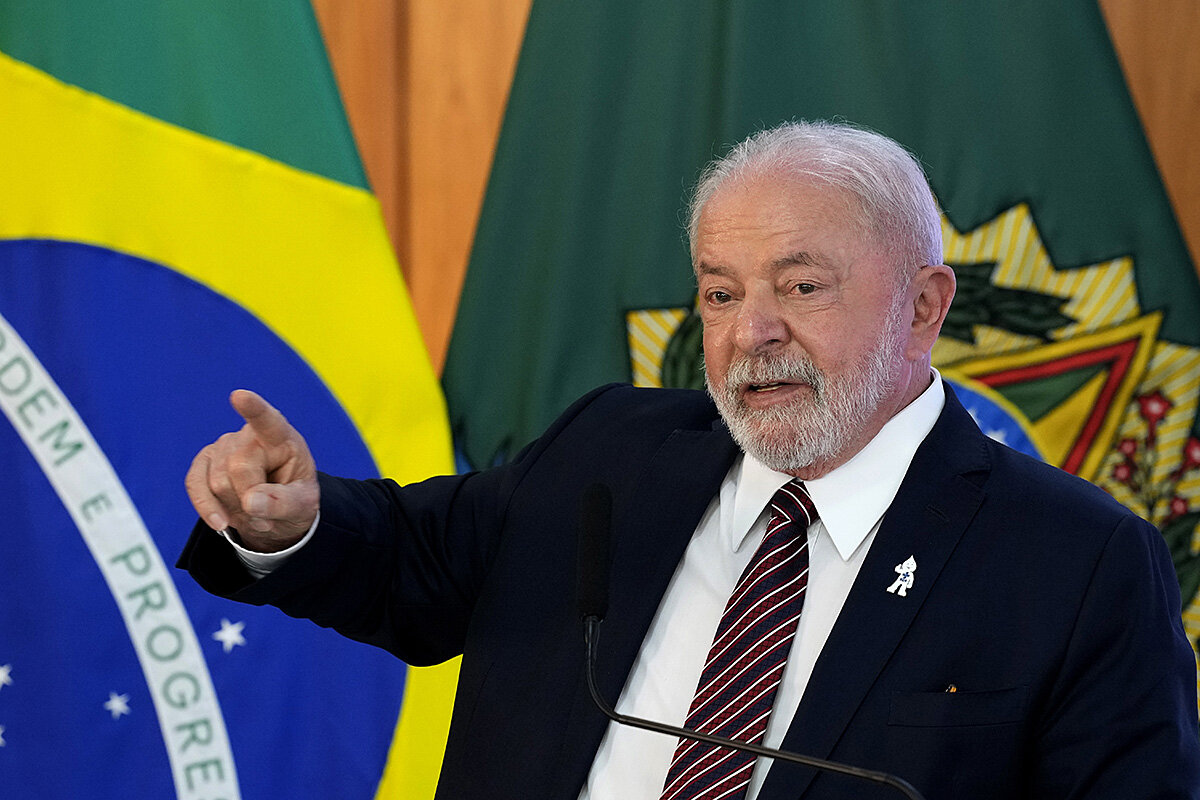Is kicking out illegal miners enough to save Brazil’s Amazon?
Loading...
| Rio de Janeiro
Deep in the Brazilian Amazon in early February, wildcat miners sped down the Uraricoera River slicing through the Yanomami Indigenous reserve in three motorboats packed with barrels of gasoline and plastic foam boxes of meat.
The supplies were meant to fuel an illegal gold mine tucked in the heart of Brazil’s largest Indigenous territory. But their journey was abruptly cut short. “Everyone stop!” shouted an armed officer as police overtook the men’s boat. They raised their arms in surrender.
“There’s so much food here. ... All of these sacks here are full of food,” one officer said later, as he examined the supplies his team seized. “All the while the Yanomami are starving.”
Why We Wrote This
A story focused onBrazil’s president is doubling down on protecting the Amazon – crucial for combatting global warming. But policing illegal activities may not be enough.
In a high-profile crackdown, Brazilian authorities have raided more than 200 wildcat mines – known as garimpo – across the Yanomami reserve in recent months, arresting miners, seizing supplies, and setting machinery ablaze. The aim is to expel some 20,000 illegal miners who have invaded the reserve since 2019, ushering in disease, deforestation, hunger, and conflict – and transforming the Yanomami into a symbol of the widespread destruction gripping the world’s largest rainforest.
The offensive is part of a plan by President Luiz Inácio Lula da Silva to pivot toward protection in the Amazon, after years of rapid destruction under the administration of Jair Bolsonaro. Placing the environment at the center of his agenda, Lula, as the president is commonly referred to, has vowed to halt deforestation, punish those illegally exploiting the forest, and reverse the damage done under Mr. Bolsonaro, who avidly supported opening the Amazon to mining and ranching.
“The commitment is, by 2030, to have zero deforestation in the Amazon. And I will pursue this with all my might,” Lula said earlier this year.
Keen to send a clear message from the start, Lula made expelling the wildcat miners from the Yanomami reserve one of his first major acts since taking office on Jan. 1. He has promised to carry out similar operations in at least six other Indigenous reserves in the coming months.
Despite the bold strategy, some 330 square miles of forest were razed in the Amazon in the first three months of the year, data from Brazil’s space agency showed earlier this month, marking the second-highest rate of deforestation on record and suggesting that those bent on destroying the rainforest have little intention of giving up. As Lula doubles down on protecting the forest, observers say attention needs to move beyond crackdowns on illegal mining to include offering economic alternatives for those who turn to this kind of work in the first place.
“This change in government feels like a sigh of relief,” says Martha Fellows, a researcher at the Amazon Environmental Research Institute (IPAM). But, she adds, “the culture of destruction still persists. Unfortunately, this is a culture that doesn’t disappear overnight.”
Decades-old battle
From above, the Yanomami reserve looks like a patchwork of emerald canopy and vast craters filled with murky pools of wastewater. There, the tussle over land can be traced back to the 1970s, when loggers and miners first began trickling in.
By the 1990s, when federal authorities declared the area an Indigenous reserve, it was already overrun by some 40,000 illegal miners –about twice the number thought to be operating there today.
João Moreira arrived in Yanomami in the late 1980s, hoping to strike it rich in a gold mine. It was hard, punishing work; many of the men who toiled alongside him were poor and illiterate, with few other economic prospects.
“Those who come to the Amazon are living through hardship and searching for opportunity,” he says. “And the garimpo gives them that opportunity to dream and to get ahead in life. It’s like you’ve won the lottery.”
He remembers flying from the state capital Boa Vista to the Indigenous land on a small plane, over the dense forest cover, toward the illegal landing strip near the mine. “There was nothing there, just jungle, jungle, jungle” he recalls in a phone interview from Planalto da Serra, in the state of Mato Grosso, where he now lives.
Police tried to expel Mr. Moreira’s group once, but the men just came back when the dust settled. Finally, in 1992, authorities succeeded in removing the outsiders, including Mr. Moreira, and returning the land back to the tens of thousands of Yanomami people who have lived there for centuries, some of them in voluntary isolation from the outside world.
But in 2019, as Mr. Bolsonaro moved to loosen environmental policing, illegal miners saw an opportunity to descend on the territory once again. “The Brazilian state has an obligation to protect Indigenous lands,” says Edinho Batista, coordinator of the Indigenous Council of Roraima, where the Yanomami reserve is located. “But what we saw during the last four years was the exact opposite. That’s how we got to this crisis.”
In the wake of the latest crackdown in the reserve, many illegal miners have voluntarily left. Mr. Moreira himself left the gold trade many years back, opening a construction firm. But he doubts the miners pouring out of the reserve now will give up for good.
“They’re just going to come back, or go to another part of the Amazon,” he says. “Many don’t know how to do anything else.”
A new chapter
Under Mr. Bolsonaro, deforestation in the Brazilian Amazon soared to its highest level in 15 years, as emboldened intruders rushed to raze and burn slices of the forest. Mr. Bolsonaro regularly railed against environmental protections, arguing they only got in the way of development, and he gutted agencies of the resources and staff needed to protect both the rainforest and the people who depend on it. Local bases staffed by environmental enforcement agents shuttered across the Amazon, leaving a vacuum that criminals easily exploited.
On the international stage, Lula has made big promises to crack down on deforestation, to punish those encroaching on the forest, and to turn Brazil into a leader in the global scramble to avert a climate crisis.
“The Amazon has one of the largest carbon stocks in the world, so it’s crucial for the regulation of the climate,” says Ms. Fellows of IPAM. “We do have to think globally. ... The Amazon isn’t relevant just locally to us.”
Lula’s track record offers reason to hope: During his first two terms in office, between 2003 and 2010, the leftist leader helped slash deforestation by 80% and turned Brazil into a global champion in forest conservation.
Since returning to office, he has revived an international fund that once financed conservation projects, but was suspended in 2019 amid soaring deforestation, freezing over $500 million in aid.
He has toughened up policing, too. In the first three months of the year, fines for deforestation jumped 219%, according to the Ministry of Environment. And in the Yanomami reserve, agents have so far seized 84 barges and boats, two planes, 172 generators, a mining rig, and 3,000 gallons of fuel.
“You’re sending the message that garimpo won’t be tolerated – and all of a sudden, illegal miners start thinking twice about whether it might be bad for business,” says Danicley de Aguia, a campaigner with Greenpeace Brazil.
Still, environmentalists say bold crackdowns may not be enough. Effectively policing the Brazilian Amazon, which stretches across millions of miles, is notoriously difficult – and costly. It can take environmental agents days, whether by motorboat or rough dirt road, to reach illegal mines and ranches tucked deep in the jungle.
Offering alternatives
To truly root out illegal extraction in the Amazon, Mr. de Aguia says, the government must develop economic alternatives that make preserving the forest more attractive.
“The problem in the Amazon is an economic one – and deforestation is a symptom of it, not the cause,” he says. “You might be able to slash the deforestation rate again. But if there’s no other option, at the first sign of weakening enforcement, it jumps back up again.”
The Amazon is one of Brazil’s most politically and economically neglected regions, with millions living below the poverty line. With huge swaths isolated from the rest of the country, many residents struggle to access basic services like health care and schooling.
Lula has advocated for investing in green jobs and exploring the rainforest for new ingredients that can be used in medicines and cosmetics. He says communities can earn income from the forest by selling exotic fruits and nuts, but the plan has been criticized for being vague.
“We need economic solutions in the Amazon,” says Mr. de Aguia. “It’s always the hand of the poor man that picks up the chainsaw.”








